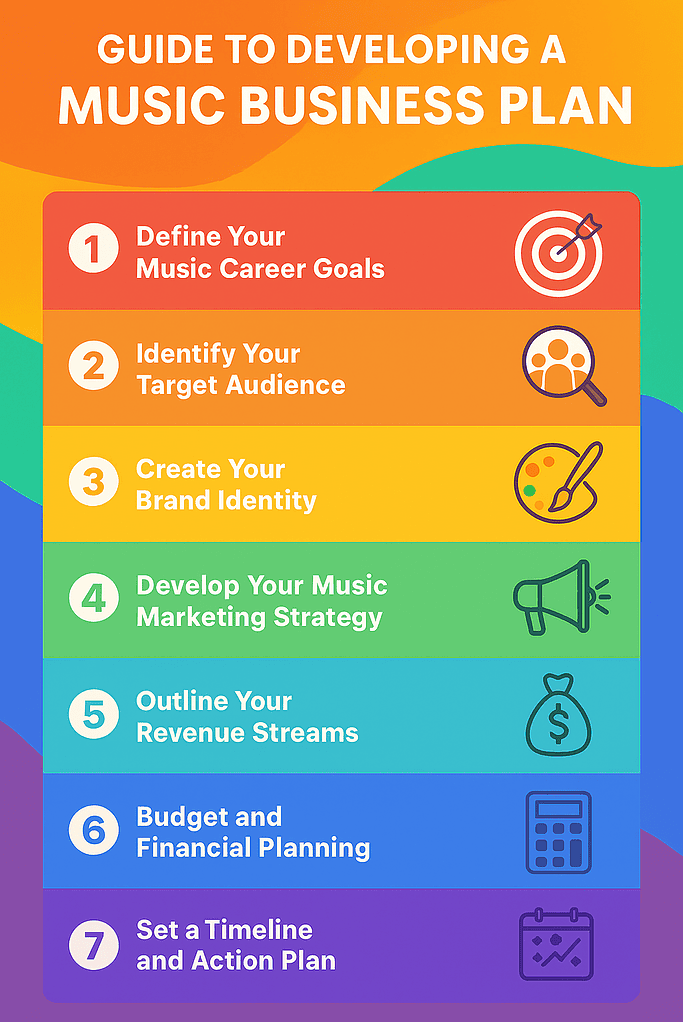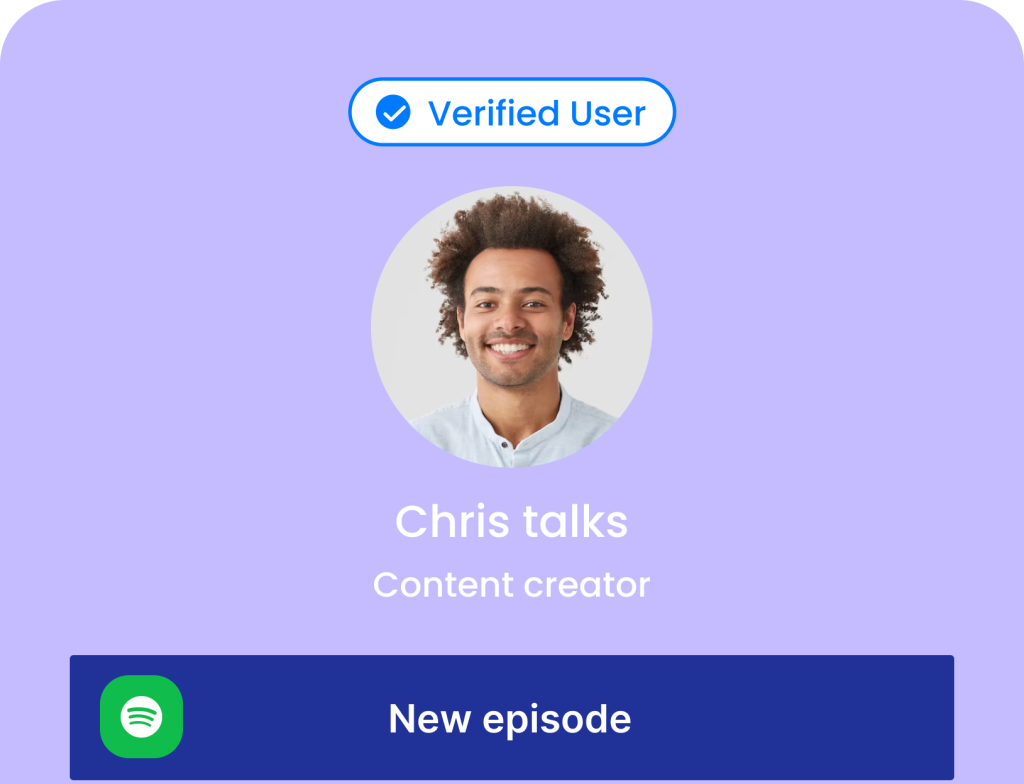Everyday, more artists and audio content creators are rising to fame than ever before. With platforms like Spotify, Apple Music, YouTube, and TikTok, musicians can share their work with a global audience in seconds. These platforms not only give exposure but also open doors to monetization through streaming, sponsorships, merchandise sales, and live performances.
However, talent alone is no longer enough to succeed in the competitive music industry, you need a clear plan. This is where developing a music business plan becomes essential. A music business plan is a roadmap that outlines your goals, strategies, audience, and revenue streams.
Whether you’re an independent artist, a band, or a music manager, having this plan helps you stay focused, attract investors, and make informed decisions. This means having a music business plan in hand can set the foundation for a sustainable career, turning your passion for music into a profitable business.
Why you need a music business plan
The music industry is full of opportunities, but also tough competition. Without a clear plan, it’s easy to lose focus and miss out on growth. Here’s why developing a music business plan is essential for a sustainable career:
1. Gives you a clear direction
When you start your music career without a plan, it’s easy to feel lost. Developing a music business plan acts like a map, showing you where you want to go and how to get there. It helps you focus on your goals and avoid distractions that slow your progress. With clear steps in place, you can work smarter, not harder, to achieve success in the industry.
2. Helps attract investors and sponsors
If you want financial support from investors, brands, or music labels, you need to show them you’re serious. A detailed plan proves that you’ve done your homework and understand how to grow your career. When you build an artist business plan that outlines your audience, revenue streams, and growth strategies, you increase your chances of securing funding for your music projects.
3. Keeps you organized and focused
A lot happens in a music career from recording, marketing, to touring and more. Without structure, it’s easy to lose track. Creating an effective musician business plan keeps everything organized in one place, so you always know your next steps. It also helps you manage time better, making sure you give equal attention to both your creative work and business responsibilities.
4. Identifies your target audience
Knowing who you make music for is key to growing your fanbase. Your business plan should include details about your ideal listeners; their age, interests, location, and music preferences. This information helps you create music and marketing campaigns that connect with the right people. The clearer your audience profile, the easier it is to build loyal fans who support your career.
5. Strengthens your marketing strategy
Promotion is just as important as making great music. When you develop a music business plan, you also create a strategy to share your music effectively. This can include social media campaigns, collaborations, live events, and playlist submissions. A strong marketing plan ensures your songs reach more people, helping you grow your brand and increase your income over time.
6. Improves financial planning
Making money from music requires careful budgeting. Your plan should outline your expenses (like studio time, music videos, and promotion) and expected income sources (such as streaming, merchandise, and performances). By tracking your finances, you can avoid debt, reinvest profits wisely, and make better business decisions. Financial clarity is one of the biggest advantages of building an artist business plan.
7. Prepares you for challenges and growth
The music industry changes fast, and unexpected challenges can come up from canceled shows to shifting trends. A good business plan includes backup strategies so you can adapt quickly. It also makes it easier to scale your career when opportunities arise, whether it’s signing a bigger deal, expanding your team, or entering new markets. With a plan, you’re ready for anything.
A step-by-step guide to developing a music business plan
Developing a music business plan is the key to turning your musical passion into a sustainable career. It helps you set clear goals, manage finances, and grow your audience effectively.

To get started with your music business plan, you should consider the following essentials:.
1. Define your music career goals
Clear goals give your music career direction and purpose. When developing a music business plan, this step ensures every decision supports your dreams. Goals help you measure progress and stay motivated on your journey.
A. Set short-term goals
Focus on goals you can achieve within a year, like releasing an EP or booking local gigs. Short-term wins keep you motivated while working toward bigger milestones.
B. Set long-term goals
Plan where you want to be in 3 to 5 years. The goal can be to headline a world tour or have a chart-topping album. Long-term goals guide big career decisions and investments.
C. Make goals SMART
SMART goals are Specific, Measurable, Achievable, Relevant, and Time-bound. This method keeps your plans realistic while pushing you to grow steadily in your career.
D. Break goals into tasks
Divide each goal into smaller actions, like writing songs weekly or networking monthly. Smaller steps make big goals less overwhelming and easier to track.
E. Review and adjust goals
Check your progress often. If something isn’t working, adjust timelines or methods. Flexibility keeps your goals realistic while adapting to changes in the music industry.
2. Create your brand identity
Branding sets you apart in a crowded industry. When you build an artist business plan, defining your image ensures fans remember you and your music.
A. Choose a unique artist name
Select a memorable name that captures your personality, music style, and vision. A unique name makes you stand out and is easier for fans to remember and search online.
B. Design a visual style
Pick consistent colors, fonts, and logo designs that reflect your sound and image. A strong visual style helps your audience instantly recognize your brand across platforms and promotions.
C. Define your artist story
Share your musical journey, inspirations, and personal values authentically. A well-told story builds emotional connections, making fans relate to you beyond just your songs or performances.
D. Maintain consistent messaging
Use a clear, recognizable tone and style in all communications. Consistency across platforms strengthens brand trust, making your audience feel connected and confident in your artistry.
E. Align music with branding
Match your music’s sound, visuals, and themes to your overall brand identity. This alignment ensures your work feels authentic, cohesive, and memorable in the eyes of your audience.
3. Identify your target audience
Knowing your audience helps you create an effective musician business plan that connects with the right people. This means understanding who listens to your music can ensure better promotion, engagement, and sales.
A. Research demographics
Find out your listeners’ age, location, and interests. This data helps you create content and songs that appeal to the right group.
B. Study listening habits
See how and when your audience consumes music. Use platforms like Spotify for Artists, Soundcloud, Apple Music, or YouTube Analytics for valuable insights.
C. Use social media insights
Check Instagram, TikTok, and Facebook analytics to learn about your followers. These tools reveal what type of posts and content they enjoy most.
D. Build audience personas
Create profiles of your ideal fans with details about lifestyle and preferences. This helps you tailor your music and marketing approach.
E. Track audience growth
Regularly measure followers, streams, and engagement. Tracking growth ensures your strategies are attracting and keeping the right listeners.
4. Develop your music marketing strategy
Marketing ensures your music reaches the right people. An effective marketing strategy in developing a music business plan boosts visibility and grows your fanbase.
A. Plan social media content
Create a consistent posting schedule with engaging photos, videos, and behind-the-scenes moments. This keeps your audience interested, builds your brand, and ensures you remain active and relevant online.
B. Collaborate with other artists
Partner with musicians or influencers in your genre for joint projects. Collaborations help you share audiences, expand reach, and gain exposure to fans who may not have discovered you otherwise.
C. Pitch to playlists
Submit your tracks to Spotify, YouTube, or curated playlist editors. Playlist features can dramatically boost streams, visibility, and new fan discovery without relying solely on organic reach. You can use platforms like Pushbio to curate a playlist for your social media bios.
D. Host live performances
Play at concerts, festivals, or online livestream events. Live shows deepen fan connections, showcase your talent in real time, and can generate both income and valuable publicity.
E. Use paid advertising
Invest in targeted ads on social media or streaming platforms. This allows you to reach your ideal audience faster, promote new releases, and increase engagement effectively.
5. Outline your revenue streams
A sustainable career needs multiple income sources. When you create an effective musician business plan, include ways to earn from your talent.
A. Streaming and downloads
Platforms like Spotify, Apple Music, and Bandcamp let fans stream or buy your music. More plays and purchases mean steady income while boosting your visibility in the music industry.
B. Merchandise sales
Selling branded T-shirts, caps, posters, and other items helps build your brand identity. Fans love owning physical items, and merchandise can become a consistent extra revenue stream.
C. Live performances
Gigs, tours, and private shows allow you to earn performance fees while building stronger fan connections. Live events also help promote new releases and expand your audience reach. With Pushbio, you can easily sell tickets to your live events.
D. Licensing and sync deals
By licensing your music for films, TV shows, ads, or video games, you can earn significant income. These deals also increase your exposure to new audiences globally.
E. Crowdfunding and fan support
Platforms like Pushbio, Patreon or Kickstarter let fans directly support your work financially. In return, offer exclusive perks, early access to songs, or behind-the-scenes content to keep them engaged.
6. Budget and financial planning
Money management is key in building an artist business plan. A clear budget keeps you in control of costs and profits.
A. List all expenses
Write down every cost you expect, like studio recording, marketing campaigns, travel for gigs, and buying instruments or equipment. This ensures you know exactly where your money is going.
B. Estimate your income
Plan how much you expect to earn from live shows, merchandise sales, streaming royalties, and licensing deals. This helps you understand potential profits and prepare for any shortfalls.
C. Track monthly cash flow
Monitor your income and expenses each month. Tracking cash flow helps prevent overspending, keeps you financially organized, and allows you to make smarter business decisions for your music career.
D. Set a savings plan
Put aside a set percentage of your income every month. This savings can cover emergencies, unexpected costs, or fund larger music projects like tours or album production.
E. Reinvest in your career
Use part of your profits to improve your music quality, expand marketing, or upgrade equipment. Reinvesting ensures steady growth and long-term sustainability in your music career.
7. Set a timeline and action plan
A timeline keeps you moving forward. In developing a music business plan, deadlines push you to stay consistent.
A. Break goals into stages
Divide big goals into smaller weekly, monthly, and yearly milestones. This makes progress easier to track and helps you stay motivated without feeling overwhelmed by the bigger picture.
B. Use productivity tools
Organize and track your tasks using tools like Trello, Notion, or Google Sheets. These platforms help you plan, set reminders, and keep all your music business plans in one place.
C. Prioritize important tasks
Focus on the actions that bring the most impact first, like releasing music or booking shows. Prioritizing ensures you use your time effectively and see results faster.
D. Set realistic deadlines
Avoid overloading yourself with tight schedules. Give enough time to complete tasks well while maintaining balance, reducing stress, and preventing burnout in your music career journey.
E. Review progress regularly
Check your progress weekly or monthly. Identify what’s working and what needs improvement, then adjust your plan to stay on track toward your music career goals.
8. Monitor and adjust your plan
The music industry changes fast. Creating an effective musician business plan means being ready to adapt.
A. Track key metrics
Measure your music’s performance by tracking streams, ticket sales, and social media engagement. These numbers help you see what’s working and guide better business decisions for growth.
B. Collect audience feedback
Ask your fans directly through polls, comments, or surveys about what they enjoy most. Feedback helps tailor your music, branding, and shows to better meet audience expectations.
C. Watch industry trends
Stay informed on new platforms, marketing tools, and music styles. Following trends ensures your career stays relevant and competitive in the fast-changing music industry landscape.
D. Identify weak areas
Analyze your strategies to find what’s underperforming, whether it’s marketing, song promotion, or branding. Fixing weaknesses increases your chances of long-term music career success.
E. Update your plan often
Review and adjust your music business plan regularly. Industry changes, new goals, or challenges may require fresh strategies to keep your career moving forward.
FAQ
How do I start developing a music business plan?
Begin by defining your music career goals and identifying your target audience. Then, create your brand identity, outline marketing strategies, plan your revenue sources, set a budget, and create a clear timeline for action.
Can a music business plan help independent artists?
Yes, for independent artists, a music business plan acts as a roadmap for career growth. It helps in managing finances, promoting music effectively, and building a brand that stands out without relying on a label.
How often should I update my music business plan?
It’s best to review and update your plan at least once a year, or whenever there’s a major change in your goals, audience, or industry trends. Regular updates keep your strategies relevant and effective.
In summary
Creating a successful music career takes more than talent; it requires vision, planning, and consistency. When artists develop a music business plan, they set a clear path for their growth, from defining goals to building a strong brand and marketing your music effectively. The best part is that both new and artists can take time to build an artist business plan that helps them stay organized, attract opportunities, and adapt to changes in the industry.








